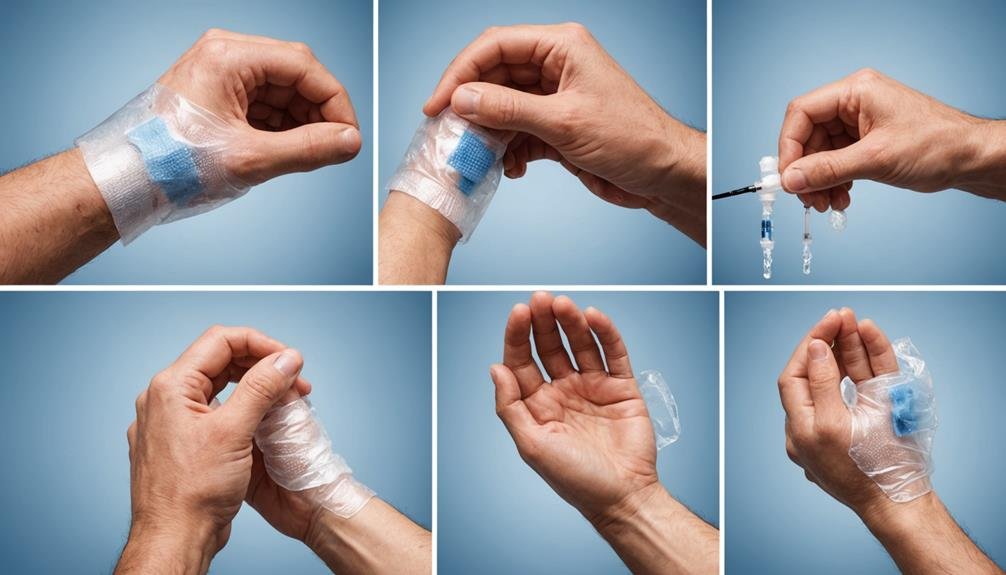If you’re dealing with knuckle swelling, you’ve probably tried a few home remedies, like ice packs or compression gloves. But what if the swelling persists? There are medical and surgical options to ponder, such as NSAIDs, corticosteroids, or even joint replacement procedures. However, it’s important to understand that each treatment’s effectiveness depends on the cause of your swelling. So, how can you find out more about these options and decide what’s best for you?
Key Takeaways
- Home remedies for knuckle swelling include applying ice packs, elevating the hand, using compression gloves, and gentle exercises.
- Over-the-counter anti-inflammatory medications like ibuprofen can be used to reduce discomfort and inflammation.
- Prescription medications such as NSAIDs, corticosteroids, DMARDs, and biologic response modifiers can be utilized to manage swelling and underlying conditions.
- When conservative treatments are ineffective, surgical interventions like joint replacement surgery or bone fusion procedures can be considered.
- Post-treatment management strategies include the RICE protocol, physical therapy exercises, and regular consultation with healthcare providers.
Understanding Knuckle Swelling
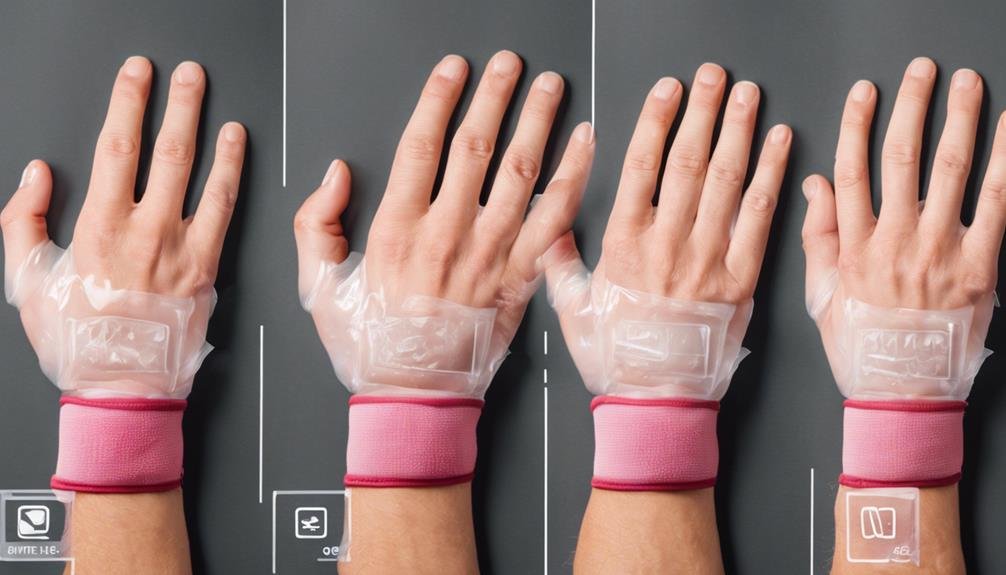
Ever wondered why your knuckles swell? Several conditions, like arthritis, can cause swelling. It’s important to understand the underlying cause for effective treatment. If your knuckles are swollen, it’s not just a minor inconvenience. It can impact your hand’s function and your overall quality of life.
Identifying the cause of your swelling is a pivotal step in determining the best treatment. Your doctor may recommend rest, ice therapy, medications, physical therapy, or in severe cases, even surgery. But remember, every case is unique, so what works for others may not work for you.
Arthritis is a common culprit behind swollen knuckles. This chronic condition leads to inflammation, causing your knuckles to bulge and become painful. It’s not just an old-age ailment, it can strike at any time, so don’t dismiss it lightly.
Timely intervention is essential. Don’t ignore the swelling and hope it’ll go away on its own. Proper diagnosis and management can help alleviate pain, reduce inflammation, and improve your hand mobility. So, if your knuckles are swelling, seek treatment promptly. Your hands are crucial for your daily activities, so take good care of them.
Common Causes of Swelling
If you notice your knuckles swelling, it’s usually due to certain underlying health conditions. One of the most common causes is arthritis, specifically forms like rheumatoid arthritis or gout. These inflammatory diseases primarily affect your joints, especially the knuckles, leading to uncomfortable swelling.
Another common cause of knuckle swelling is injuries. Perhaps you’ve fractured or dislocated your knuckle or suffered some other trauma to your hand. These types of injuries often result in noticeable swelling as your body’s responds to the damage it’s undergone.
Infections, too, can cause your knuckles to swell. These might be localized in the joint itself or in the surrounding tissues. When your body is fighting off an infection, one of the ways it responds is by swelling in the affected area.
It’s vital to identify the root cause behind your swollen knuckles. Whether it’s arthritis, an injury, or an infection, getting to the root of the problem is key. This will allow your healthcare provider to suggest the most effective treatment options to reduce your swelling and alleviate any accompanying discomfort. Don’t overlook your symptoms; seek help to get your hands back to normal.
Home Remedies for Swelling
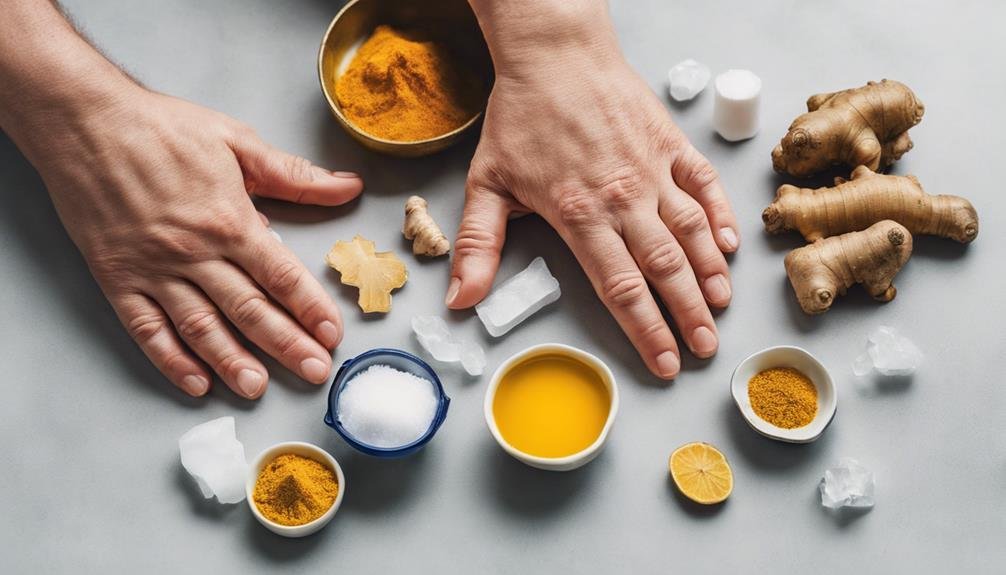
While dealing with knuckle swelling at home, there are several remedies you can try to reduce inflammation and discomfort. One of the most effective home remedies is applying ice packs or cold compresses to the swelling. Doing so can help constrict blood vessels, reducing inflammation and easing pain.
Elevation also works wonders for swollen knuckles. By keeping your hand above heart level, you encourage fluid to drain away from the affected area, reducing swelling.
Compression is another helpful tactic. Consider using compression gloves or wraps. They provide support and can help manage swelling. However, make sure they’re not too tight, as this can cut off circulation and worsen the condition.
Gentle finger and hand exercises are also beneficial. These can promote circulation and help decrease swelling. Just remember not to overdo it; you don’t want to cause further irritation or damage.
Lastly, over-the-counter anti-inflammatory medications, like ibuprofen, can be useful for alleviating discomfort. Always follow the manufacturer’s guidelines.
Medical Treatment Options
When it comes to medical treatment for your swollen knuckles, there are several options you may consider.
Prescription medications could help manage your symptoms, or perhaps a surgical intervention is necessary for more severe cases.
Let’s explore these options to better understand how they can aid in your recovery.
Prescription Medication Use
Despite your knuckle swelling, you don’t have to endure the discomfort. Prescription medications can provide relief. Nonsteroidal anti-inflammatory drugs (NSAIDs), for instance, are often prescribed to reduce inflammation and pain. For severe swelling, corticosteroids can be a powerful ally.
Moreover, if your knuckle swelling is due to an underlying inflammatory condition like rheumatoid arthritis, disease-modifying antirheumatic drugs (DMARDs) might be in order. These drugs can help manage your condition, reducing the inflammation in your knuckles. Finally, biological response modifiers may be used to treat conditions like psoriatic arthritis.
Medications are tailored to your specific needs, and their use may require monitoring for side effects. Here’s an overview:
| Drug Type | Use | Side Effects |
|---|---|---|
| NSAIDs | Reduces inflammation and pain | Can cause stomach upset, ulcers |
| Corticosteroids | Alleviates severe swelling | This can lead to weight gain, mood swings |
| DMARDs | Manages underlying inflammatory conditions | Can affect the liver, and increase infection risk |
| Biologic response modifiers | Targets specific parts of the immune system | Can lower the body’s ability to fight infection |
Surgical Intervention Considerations
In the face of persistent knuckle swelling, if conservative treatments like medication and physical therapy aren’t cutting it, surgery might come into play. Surgical intervention becomes a viable option when other methods have failed to provide relief. You’d consult with a hand specialist or orthopedic surgeon to determine the most appropriate course of action.
Common surgical options may include joint debridement, synovectomy, arthroplasty, or joint fusion. The chosen procedure will depend on the underlying cause of your knuckle swelling. These procedures aim to reduce inflammation, improve joint function, and alleviate pain.
Recovery from knuckle surgery varies. Post-operative care is a critical part of the recovery process. It typically involves physical therapy and diligent monitoring for potential complications. Your surgeon will provide you with a detailed post-operative plan, tailored to your specific needs and the type of surgery you’ve undergone.
Surgical Interventions
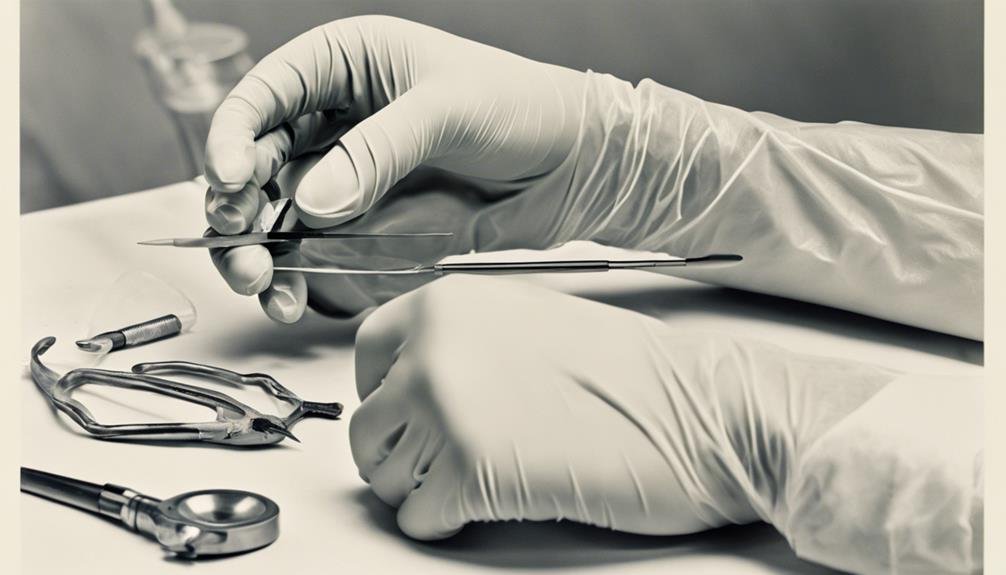
When medical treatments don’t offer enough relief, you might consider surgical interventions like joint replacement surgery or bone fusion procedures. These treatments can restore function, alleviate pain, and reduce swelling in your knuckles. We’ll explore how each procedure works and how they might improve your condition.
Joint Replacement Surgery
Opting for joint replacement surgery may seem like a challenging decision, yet it’s a far more viable solution than you might think. This procedure replaces damaged knuckle joints with artificial implants, typically recommended for severe cases of arthritis or joint damage. When your swollen fingers refuse to respond to conservative treatments, this surgery provides a ray of hope. It aims to relieve pain, improve joint function, and enhance your overall quality of life.
| Pros | Cons | Recovery Time |
|---|---|---|
| Pain relief | Major procedure | Varies |
| Improved joint function | Risks and complications | Physical therapy needed |
| Enhanced quality of life | Possible implant wear and tear | Gradual return to normal activities |
| Successful for severe arthritis |
Recovery involves physical therapy, pain management, and a gradual return to normal activities. While it’s a major procedure, advancements in technology have led to improved outcomes and reduced recovery times. So, if you’re grappling with debilitating knuckle joint issues, joint replacement surgery could be the game-changer you’ve been waiting for. With this surgical intervention, you’re not just treating symptoms; you’re reclaiming your life.
Bone Fusion Procedures
If joint replacement surgery doesn’t quite fit your circumstances, another potential game-changer to contemplate is bone fusion procedures. These operations involve surgically joining two or more bones in your finger joint. This technique is often used to tackle severe arthritis, joint instability, or deformities in the fingers. The ultimate goal is to cut down on pain, improve joint function, and enhance overall hand strength and stability.
During bone fusion procedures, your surgeon may remove damaged cartilage, realign your bones, and secure them together using metal implants or bone grafts. This strategic placement provides stability and prevents painful movement, relieving persistent discomfort.
Of course, recovery from a bone fusion isn’t immediate. Post-surgery, you’ll likely wear a splint or cast, and undergo physical therapy. Gradually, over several weeks to months, you’ll regain hand function. It’s a process that requires patience, but the potential for pain relief and improved joint function makes it a worthwhile option.
Preventive Measures for Swelling
Keep your knuckles in top shape by focusing on prevention. The key to managing Knuckle Swelling is not just treatment, but paying attention to preventive measures can greatly reduce the risk of swelling.
A healthy lifestyle plays a pivotal role. Maintaining a healthy weight and staying hydrated are essential. Regular hand exercises and limiting salt intake in your diet can also help. Additionally, it’s equally important to protect your hands from extreme temperatures and practice good hand hygiene.
Here’s a quick guide to some preventive measures you can take to avoid knuckle swelling:
| Preventive Measures | Instructions | Benefits |
|---|---|---|
| Hand exercises | Perform daily | Improves flexibility and strength |
| Healthy diet | Stay hydrated, limit salt | Helps maintain a healthy weight |
| Hand protection | Avoid extreme temperatures, maintain good hygiene | Prevents irritation and infections |
| Compression gloves | Use when needed | Reduces strain and promotes circulation |
Furthermore, consider using compression gloves and keep your hands above heart level whenever possible. Incorporating finger stretching exercises into your routine can also help in preventing swelling. Remember, prevention is always preferable to cure. Don’t wait for the swelling to start before taking action.
Coping and Management Strategies
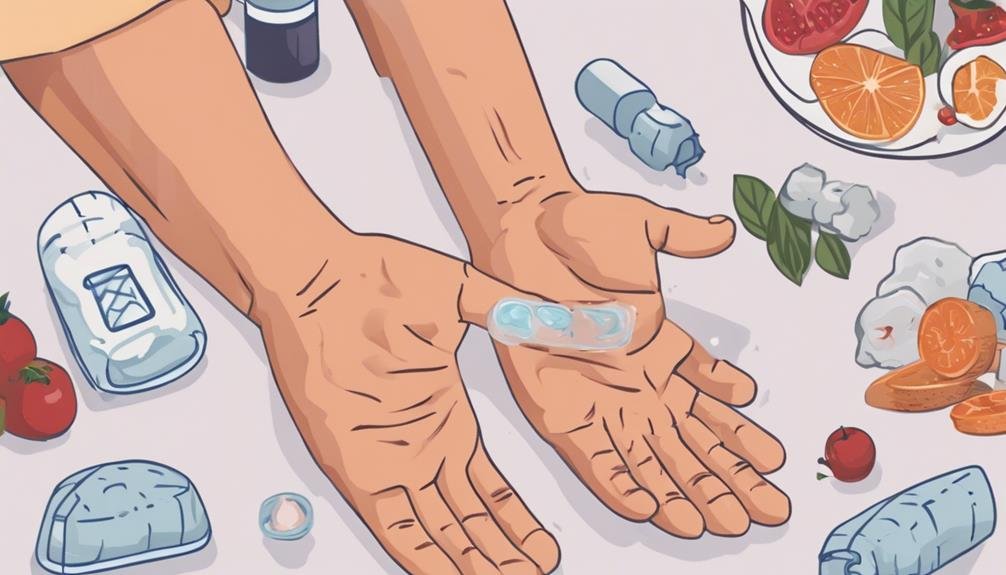
Managing knuckle swelling effectively involves a combination of self-care and medical treatments. The first step is to reduce swelling, and the RICE protocol – Rest, Ice, Compression, Elevation – is a proven method. Rest the hand, apply ice to the swollen area, use compression bandages, and elevate the hand above the heart, especially at night.
Over-the-counter anti-inflammatory medications such as ibuprofen can help relieve discomfort and reduce swelling. However, don’t overlook the significance of physical therapy exercises. Hand stretches and exercises can improve joint mobility and help manage the swelling in your knuckles.
Identifying the underlying cause of your knuckle swelling is essential. It’s important to consult with a healthcare provider to pinpoint the cause and develop a personalized treatment plan. This could involve lifestyle changes, medication, or in severe cases, surgical intervention.
Coping with knuckle swelling isn’t easy, but with the right strategies and professional advice, you can manage the symptoms and live your life. Always remember that the goal is to restore function and reduce discomfort while treating the root cause of the swelling.
Frequently Asked Questions
What Is the Fastest Way to Heal a Swollen Knuckle?
You’ll need to use ice therapy and compression to heal a swollen knuckle fast. Elevate your hand, taking over-the-counter pain relief. Rest is key, but gentle exercises can help. If it persists, see a doctor.
How Do You Treat an Inflamed Knuckle?
To treat an inflamed knuckle, you’ll first need to rest it. Then, apply ice therapy, use finger splints for support, and do gentle hand exercises. Remember to take over-the-counter anti-inflammatory medications as needed.
Can You Shrink Swollen Knuckles?
Yes, you can shrink swollen knuckles. Try ice therapy, which you can apply several times daily. Use compression techniques like gloves or wraps. Elevation is also effective; just lift your hand above your heart. Always consult a healthcare provider if it is severe.
What Anti-Inflammatory Is Good for Swollen Knuckles?
You can use over-the-counter NSAIDs, like ibuprofen, for your swollen knuckles. Topical creams with diclofenac are also effective. Natural remedies, such as turmeric or ginger supplements, can reduce inflammation too. Don’t forget lifestyle changes!
Conclusion
So, if you’re grappling with swollen knuckles, don’t fret. You’ve got plenty of options, from home remedies to medical treatments and even surgery. Remember, it’s crucial to consult your healthcare provider to tailor a plan to your needs. They’ll help you navigate pain management, possible procedures, and preventive measures. With the right approach, you can regain control and get back to your everyday life. Keep your chin up – you’re not alone in this.
